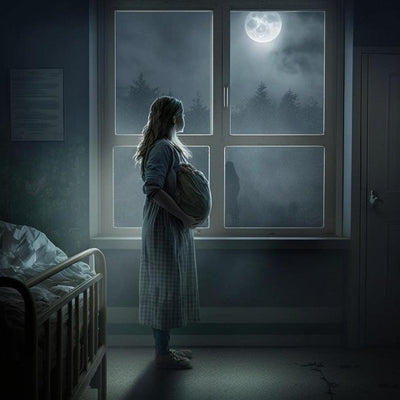Quelle est l'influence de la lune sur l'accouchement ?
6 décembre 2024

Beaucoup de femmes enceintes scrutent le calendrier lunaire pour estimer la naissance de leur bébé. Entre mythe, réalité, astrologie, croyances, comment décrypter le vrai du faux ?
Quels sont les origines du mythe de l'impact de la lune sur les naissances ?
Le cycle de la lune est souvent lié à la femme et à toutes sortes de croyances sur la fertilité, les règles, la naissance, le sommeil, le caractère, le signe astrologique.
Dans la mythologie, beaucoup de divinités de la fertilité sont liées au satellite terrestre. Chandra dans la mythologie indienne, Artémis dans la mythologie grecque, Ixchel la déesse maya de l'eau. La croyance en une connexion entre la lune et les événements liés à la gestation remonte à l'Antiquité.
Des références écrites apparaissent notamment dans des textes classiques comme Le Banquet de Platon ou encore L'Histoire des Animaux d'Aristote. Aristote y évoque l'idée que la phase croissante de la lune symbolise une période de gestation, tandis que la pleine lune faciliterait l'accouchement et la vie.
À Athènes, il était déconseillé de se marier pendant la pleine lune (nouvelle lune). Ce moment était suivi de la "lune de miel", où le miel était plutôt le signe de la fertilité que de l'amour.
Comment calculer la date d'accouchement avec la lune ?
Il est impossible de calculer avec exactitude une date d'accouchement grâce à la lune.
Une grossesse dure en moyenne 280 jours, 41 semaines et 9 mois après les dernières règles, ce qui correspond à 10 mois lunaire.
Pour calculer sa date d’accouchement avec la lune il faut connaître les 4 grands moments importants et la durée du cycle et attendre qu’il se reproduise 10 fois : la nouvelle lune, le premier quartier, la pleine lune et le dernier quartier.
- Un cycle lunaire se renouvelle chaque fois que la Terre, la Lune et le Soleil sont alignés ;
- Elle fait le tour de la terre pour revenir dans l’axe du soleil en 27,3 jours ;
- L’alignement des trois astres prend 29 jours et demi.
Peut-on prévoir la date de l'accouchement grâce à la lune ?
Le cycle de la lune étant répétitif, il est possible de l’utiliser comme un calendrier. Il est donc possible de synchroniser son calendrier de grossesse avec l’astre et d’obtenir le moment le plus près de l’accouchement.
La croyance veut qu’on ajoute 3 jours avant et 3 jours après la pleine lune pour estimer l'arrivée d’un bébé.
Voici les dates des pleines lunes pour l’année 2025.
- Lundi 13 janvier 2025
- Mercredi 12 février 2025
- Vendredi 14 mars 2025
- Dimanche 13 avril 2025
- Lundi 12 mai 2025
- Mercredi 11 juin 2025
- Jeudi 10 juillet 2025
- Samedi 9 août 2025
- Dimanche 7 septembre 2025
- Mardi 7 octobre 2025
- Mercredi 5 novembre 2025
- Vendredi 5 décembre 2025
Quels sont les effets de la lune sur l'accouchement ?
D'après la légende, la force d'attraction de la lune, ainsi que la gravité qui agit sur les marées, les mers et les océans de notre planète, auraient également un effet sur le corps qui est composé à plus de 65% d'eau. L'attraction du liquide amniotique provoquerait une rupture des de la poche des eaux.
Que dit la science sur l'impact de la lune sur l'accouchement ?
La croyance selon laquelle les phases de la lune influencent le nombre de naissances est largement répandue, y compris parmi le personnel des maternités. Quels sont les conseils de la science ?
- Dans les années 2000, une sage-femme Belge explique dans son mémoire de fin d’étude qu’elle a étudié plus de 3 000 accouchements dans 4 hôpitaux différents. Ses conclusions montrent qu’il y a le même nombre de bébés les jours de pleine lune.
- En 2005, le Mountain Area Health Education Center de Caroline du Nord (États-Unis) a réalisé une étude portant sur près de 600 000 naissances observées pendant une période de 5 ans, correspondant à 62 cycles lunaires. Cette étude a permis de conclure qu'il n'existe aucune corrélation entre la pleine lune et les naissances. Les chercheurs n’observent pas plus de naissances les soirs de pleine lune, pendant les phases descendante ou ascendante.
- Plus récemment, en 2021, une étude menée par Chambat, Fougères et Elyildirim a analysé 38,7 millions de naissances en France sur une période de 50 ans. Après avoir ajusté les données pour tenir compte des variations liées aux congés et autres facteurs sociologiques, et en appliquant des méthodes statistiques rigoureuses, les chercheurs ont observé une légère augmentation de 0,4 % des naissances lors des jours de pleine lune.
Quelle est l'influence de la lune sur le fait de tomber enceinte ?
La femme a des cycles moyens de 28 jours quant le cycle lunaire est de 29,5 jours . Ainsi, il est possible que les règles et l'ovulation arrive en même temps qu’une pleine lune.
Selon plusieurs études scientifiques, la lune n’a pas d’influence sur le fait de tomber enceinte ni sur sexe de l'enfant (une fille ou un garçon).
En effet, elle ne va pas avoir d’impact sur, la conception ni sur la qualité de l’ovulation, la rencontre avec un spermatozoïde, les chances de nidation.
La FAQ de la lune et de l’accouchement
Quelle est la lune qui fait accoucher ?
La pleine lune influencerait le nombre d’accouchements au détriment d’autres périodes : la nouvelle lune, le premier quartier et le dernier quartier.
La pleine lune a-t-elle une influence sur l'accouchement ?
Il a été prouvé par plusieurs chercheurs et études que la phase de pleine lune n’influence pas les accouchements ni les complications qu’il pourrait y avoir.
Combien de lunes pour accoucher ?
Il faut environ 10 cycles lunaires après le début des dernières règles pour qu’une grossesse arrive à terme et pour que l’accouchement se produise.


Commentaires